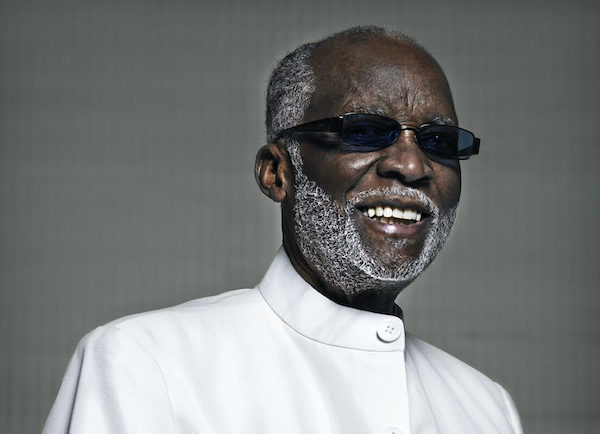Dec 9, 2025 12:28 PM
In Memoriam: Gordon Goodwin, 1954–2025
Gordon Goodwin, an award-winning saxophonist, pianist, bandleader, composer and arranger, died Dec. 8 in Los Angeles.…

Ahmad Jamal will release a new album, Marseille, on July 7.
(Photo: J-M. Lubrano)For nearly seven decades, Ahmad Jamal has influenced generations of pianists, from Red Garland to Aaron Diehl. His profound piano style is an amalgam of Art Tatum’s improvisation prowess, Erroll Garner’s ebullient flourishes and Franz Liszt’s prodigious technique. His 1958 hit LP, But Not For Me: Live At The Pershing, spent 108 weeks on the Billboard charts.
For the last few years, Jamal, 86, was rumored to be retired. But now he is back with a new album, Marseille (Jazz Village/PIAS). Supported by drummer Herlin Riley’s Crescent City cadences, Manolo Badrena’s atmospheric percussion and James Cammack’s rock-steady bass lines, the album, due out July 7, features Jamal’s trademarked use of dynamics and spatial discipline, ranging from a rocking rendition of the traditional “Sometimes I Feel Like A Motherless Child” and the maze-like “Baalbeck” to the title track, performed as an instrumental with lyrics delivered by French rapper Abd Al-Malik and chanteuse Mina Agossi.
DownBeat spoke to Jamal by phone from his Massachusetts home about his time off, his return to the studio, his legacy and his love of France.
Let’s talk about your retirement.
Well, I never actually said that I retired (laughs). In 2014, at a concert in Prague, I disclosed to my men that I wasn’t going to accept any more engagements. That’s why I never came out with a blanket statement saying I retired.
By the way, I was semi-retired from 1969 to 1972. I founded a record company on 57th Street in New York City. I was producing records and managing. I’ve been touring since I was 17 years old (laughs). I left home as a kid. That’s much too young. Instead of going to Juilliard, I jumped on the road, and I’ve been on the road ever since.
The musicians you work with have been an integral part of your career, on the road and in the studio. Talk about the musicians in your current quartet, starting with James Cammack.
James has been with me for 35 years. He came to me from the Army Band at West Point, where he played bass and trumpet. James is one of my great line of bassists, including Johnny Pate, who did the score to Curtis Mayfield’s soundtrack to Superfly; Richard Davis; Wyatt Ruther, who ended his career with Erroll Garner; and Eddie Calhoun, who also played with Errol Garner. And there’s Reginald Veal, who alternates with James Cammack.
The prototype for all of the bassists you’ve worked with was Israel Crosby, who was part of the historic Live At The Pershing recording.
Israel Crosby wrote “Blues For Israel” when he was 16 years old, working for Gene Krupa! And he was one the first African American studio musicians in New York City. [And early in my career] I was his pianist in his group!
And then there’s Herlin Riley, who worked with Wynton Marsalis, and first appeared on your 1985 recording, Digital Works.
When I was in New Orleans, I needed a drummer. And a wonderful trumpet player said I’ll find someone for you, and found me Herlin. That was around 1982–’83.
Riley is the latest in a long line of New Orleans drummers you’ve employed, starting with the impeccable Vernel Fournier, whose second-line syncopations pulsed your biggest hit, “Poinciana.”
There’s James Johnson. He’s from Pittsburgh, but he was born in New Orleans. And of course, there’s Idris Muhammad. But the first one was Vernel Fournier. I found him in Chicago. He was one of the most sought after drummers there. It took some time for me to him to join my group because he was so busy. He was one of the most emulated drummers in the world. People are still trying to figure out how he played “Poinciana” on Live At The Pershing, because he sounded like two drummers.

Goodwin was one of the most acclaimed, successful and influential jazz musicians of his generation.
Dec 9, 2025 12:28 PM
Gordon Goodwin, an award-winning saxophonist, pianist, bandleader, composer and arranger, died Dec. 8 in Los Angeles.…

Belá Fleck during an interview with Fredrika Whitfield on CNN.
Jan 13, 2026 2:09 PM
The fallout from the renaming of the John F. Kennedy Center for the Performing Arts to include President Donald…

The success of Oregon’s first album, 1971’s Music Of Another Present Era, allowed Towner to establish a solo career.
Jan 19, 2026 5:02 PM
Ralph Towner, a guitarist and composer who blended multiple genres, including jazz — and throughout them all remained…

Rico’s Anti-Microbial Instrument Swab
Jan 19, 2026 2:48 PM
With this year’s NAMM Show right around the corner, we can look forward to plenty of new and innovative instruments…

Peplowski first came to prominence in legacy swing bands, including the final iteration of the Benny Goodman Orchestra, before beginning a solo career in the late 1980s.
Feb 3, 2026 12:10 AM
Ken Peplowski, a clarinetist and tenor saxophonist who straddled the worlds of traditional and modern jazz, died Feb. 2…